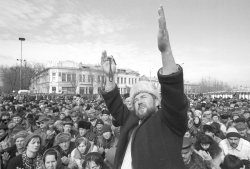Yevhen PRONIUK: “POLITICAL PRISONERS IN UKRAINE ARE STILL UNDER PRESSURE”

Over 50,000 people now living in Ukraine experienced the effects of USSR repressive machine created to suppress any demonstration of “wrong thinking.” Among them are those who were repressed in Stalin period, political prisoners of later years, and the whole nations which had been expelled.
Yevhen Proniuk, head of All-Ukrainian Society of Political Prisoners and Victims of Repression, is aware of their problems more than anyone else. He participated in the dissident movement and as a result was among victims of the notorious concentration camps.
YP: I even have two papers confirming my rehabilitation. I was rehabilitated after deportation to a penal colony in Kazakhstan in 1947. And in 1972 I was arrested on charges of anti-Soviet agitation and propaganda under article 62 of the former criminal code. And then I was rehabilitated again.
In April 1991 Verkhovna Rada being in the first session adopted the law On the Rehabilitation of the Victims of Political Repression. But at the same time several regulations were inserted in this law which made it ineffective.
Since I was elected to Verkhovna Rada and have become the head of the subcommittee on citizens with special legal status, mainly having been repressed, I have continued this work. Our subcommittee worked out some amendments to the law taking into account many clashes which had arisen. These amendments have been on the agenda of Verkhovna Rada sessions a hundred times but they’ve never been considered. Most deputies don’t even want to hear anything about the terror which haunted people in Ukraine for more than 70 years. Moreover, every time this issue is brought up they respond in a quite irreconcilable way. Indeed, there was no family in Ukraine which didn’t experience the horror of repression or the famines of 1921, 1933, and 1947.
Victims of the German occupation, veterans of the Great Patriotic War and other wars did get certain legislative support. As for the political prisoners, victims of the war against the totalitarian regime which ruined the lives of many people, they have got nothing.
The Cabinet of Ministers also “supported” Parliament’s ignoring the lives of the former prisoners. For example, our government issued a decree which violates their restricted rights. According to the law those who have been rehabilitated are supposed to receive compensation equal to the minimum wage (15 hryvnias). But Cabinet of Ministers decree No. 429, of April 18, 1996, reduced this minimum to 7.5 hryvnias.
The same thing happened concerning the compensation for confiscated property. For instance, if housing can’t be returned to its owners, restitution will be such a small sum of money that most people refuse it. If the house is occupied by the village administration or some office, its former owner is given 100 hryvnias compensation! Actually the deputies in Parliament owe their seats to former political prisoners. Present ministers also have much to be grateful from them. But it is the former political prisoner who is left in the most miserable state.
The Day: Are there any political prisoners in Ukraine now?
YP: The last Ukrainian Soviet political prisoners were released from the notorious Perm camps in April 1991. During the election campaign period we had several political arrests. There is one more thing we can’t omit, violations of human rights in prisons (beatings, tortures, and unbearable living conditions). Besides, nobody knows who wants to liquidate political adversaries, but the threats, murder attempts, and terrorist acts have become a part of life.
The Day: Can we draw a line between political and criminal persecution?
YP: Yes, we can in most cases. However, the authorities always tried to tag political prisoners with different crimes requiring severe, long-term sentences: rape, robbery, treason to the Homeland.
The Day: There is a notion that everybody in the land of Soviets were prisoners no matter whether they stayed behind the barbed wire or outside it. The whole country was repressed. So, is it fair to give compensation to those who stayed in the restricted zones and not to mention the rest of the population?
YP: Although life in the “big” camp was rather tough, people who were in the so-called restricted zones experienced indescribable violence by the authorities. Only a person who went through all this terror can understand it. I believe those who express such ideas wouldn’t like to become restricted zone inhabitants for some ten years even with the prospect of future compensation. It is incomparable.
When I recall Valery Marchenko, I feel ashamed of the fact that such a person was destroyed! The same thing happened with Stus, Tykhy... And we don’t know yet how many unknown victims perished. So, now our Society is working on creating a museum of political prisoners and repression victims. We want our new generation to know its own history.
Nowadays there are 50,000 former political prisoners in Ukraine. Their living conditions are terrible, and many suffer from various diseases. We have helped hundreds and thousands of people who had been deprived of their legal but very limited rights by the local authorities. We want them to feel themselves not victims but citizens of the country which owes them so much.
Reuters Photo:
"We pray to different Gods but for us Ukraine is one!" The Crimean Tatars await their recognition as citizens of Ukraine






